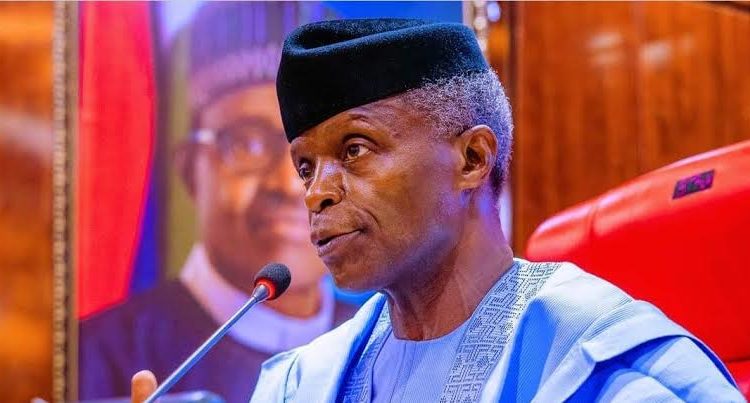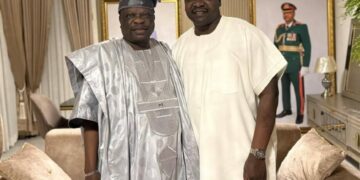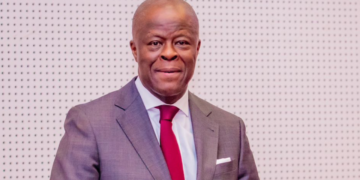Being the greatest asset for any nation, the most important objectives for Nigeria and other governments particularly in West Africa should be the improvement of the quality of life, living standards and livelihoods of its people, according to Vice President Yemi Osinbajo (SAN).
Osinbajo stated this on Thursday in Abuja, at the launch of the Integrated Regional Human Capital Development Strategy documents of the Human Capital Development -HCD-Programmes for both ECOWAS and Nigeria, by the Core Working Group on Human Capital Development of the National Economic Council (NEC).
According to a statement by his media aide, Laolu Akande, at the event which held at the Transcorp Hilton, Abuja, the VP was joined by the Prime Minister of Guinea-Bissau, Mr Nuno Gomes Nabiam; representatives of the Vice Presidents of Sierra Leone and Senegal; and the Vice President of the ECOWAS Commission, Finda Koroma. There were also several State Governors, Deputy Governors and members of the Federal Executive Council.
In his speech, the vice president emphasised that “nothing is as important as “the happiness, security and general welfare of our populations.”
Highlighting the importance of investing in Human Capital Development in any nation, the VP stated that “our people are central to all that governments, private sector and civil society partners do. The most important pieces of work that we can do are on planning and investing in human capital development, healthcare, nutrition, quality education, skills, and jobs.”
Buttressing the reasons why government should make more investments on its Human Capital Development, including in areas of Health, Education, nutrition, the Vice President noted for instance that “inadequate nourishment results in suboptimal learning outcomes and a lifetime of disadvantage especially in what is becoming a fiercely competitive knowledge economy.”
“Also, because idle, youthful populations portend an increased risk of social instability; we must invest in relevant skills as we provide good paying jobs and opportunities.”
According to the VP, “the effective use of scarce resources is the thin line between demographic dividend and a demographic disaster.”
Whether those resources are judiciously used or used in a manner that best benefits our people or whether those resources are squandered is what will mean the difference in the dividends we expect for our population or just misery and disaster,” the VP added.
Speaking further, Osinbajo stated that investments in HCD is more crucial at a time when the African continent has the youngest and growing population at about double the rate compared to the rest of the world.
“By 2050 West Africa will have 650 million people. Almost 400m will be young people. And we will have to provide quality basic education and healthcare for them and nutrition,” the VP noted.
Observing that Nigeria and other African countries are in a race against time, Prof. Osinbajo further observed that “all these mean that Governments face huge public expenditures, and these expenditures grow as our populations increase daily.”
However, despite local and global macroeconomic challenges, there are also opportunities for African governments to harness the potential of its people for further development, Prof. Osinbajo emphasised.
“In these massive challenges lie the incredible opportunities of being the most profitable investment frontier in the world, of becoming the global food basket, of becoming the greatest source of highly trained Human Resources in technology, engineering , sciences and in the creative sector among others,” he noted.
The vice president also recalled that in 2018, President Muhammadu Buhari had initiated the National Human Capital Development Programme charging NEC with the task of addressing the critical issues of citizens’ wellbeing holistically and in an enduring manner.
This directive led to the formation of the NEC HCD Steering Committee and the Core Working Group on Human Capital Development.
In her remarks, Ms. Yosola Akinbi, Head of the NEC HCD Core Working Group , noted that the HCD programme was designed in recognition of the crucial role that Human Capital Development plays in addressing poverty and ensuring sustainable economic growth.
Other ECOWAS leaders present, the event also had goodwill messages and remarks from the Vice President of the ECOWAS Commission, Finda Koroma; Nasarawa State Governor, Abdullahi Sule; Minister of Finance, Budget and National Planning, Mrs. Zainab Shamsuna Ahmed; British High Commissioner to Nigeria, Catriona Laing; World Bank Country Director for Nigeria, Mr Shubham Chaudhuri; representative of the Aliko Dangote Foundation, Hajiya Fatima Wali; Deputy Chief of Staff to the President in the Office of the Vice President, Mr Ade Ipaye.





